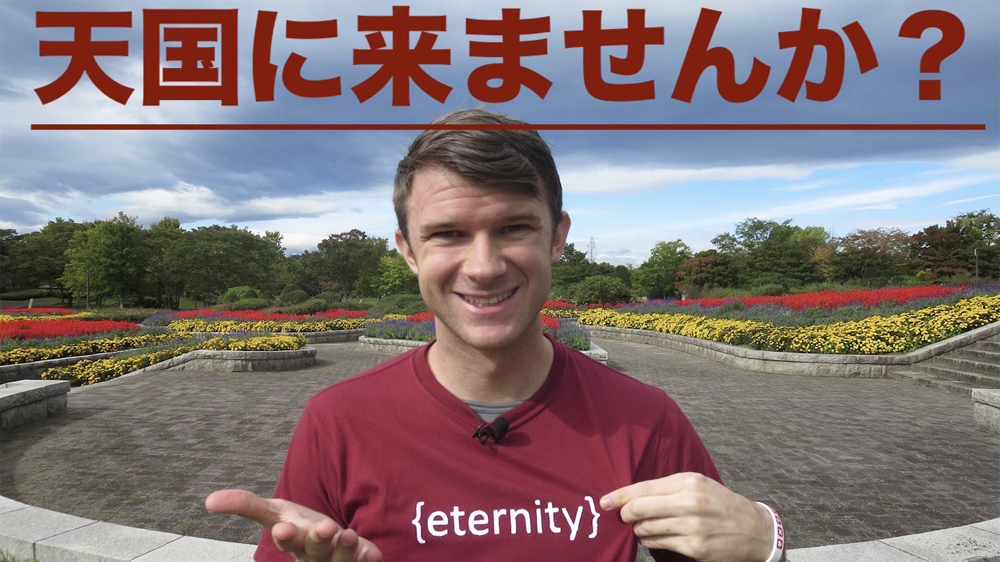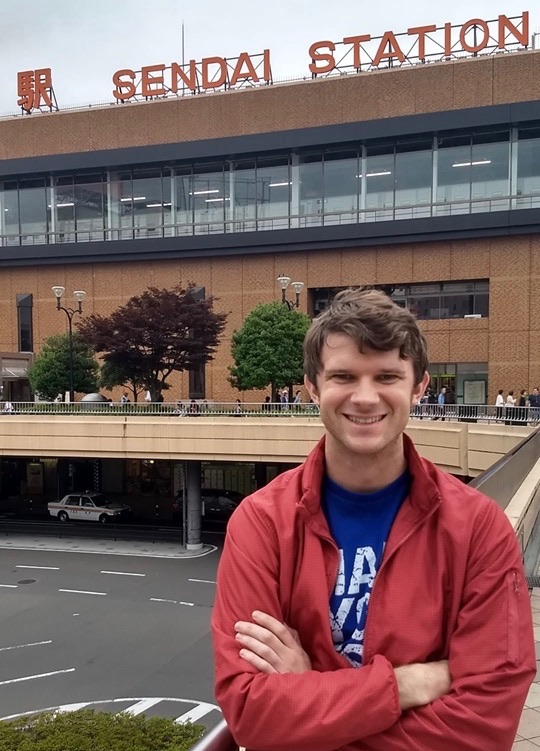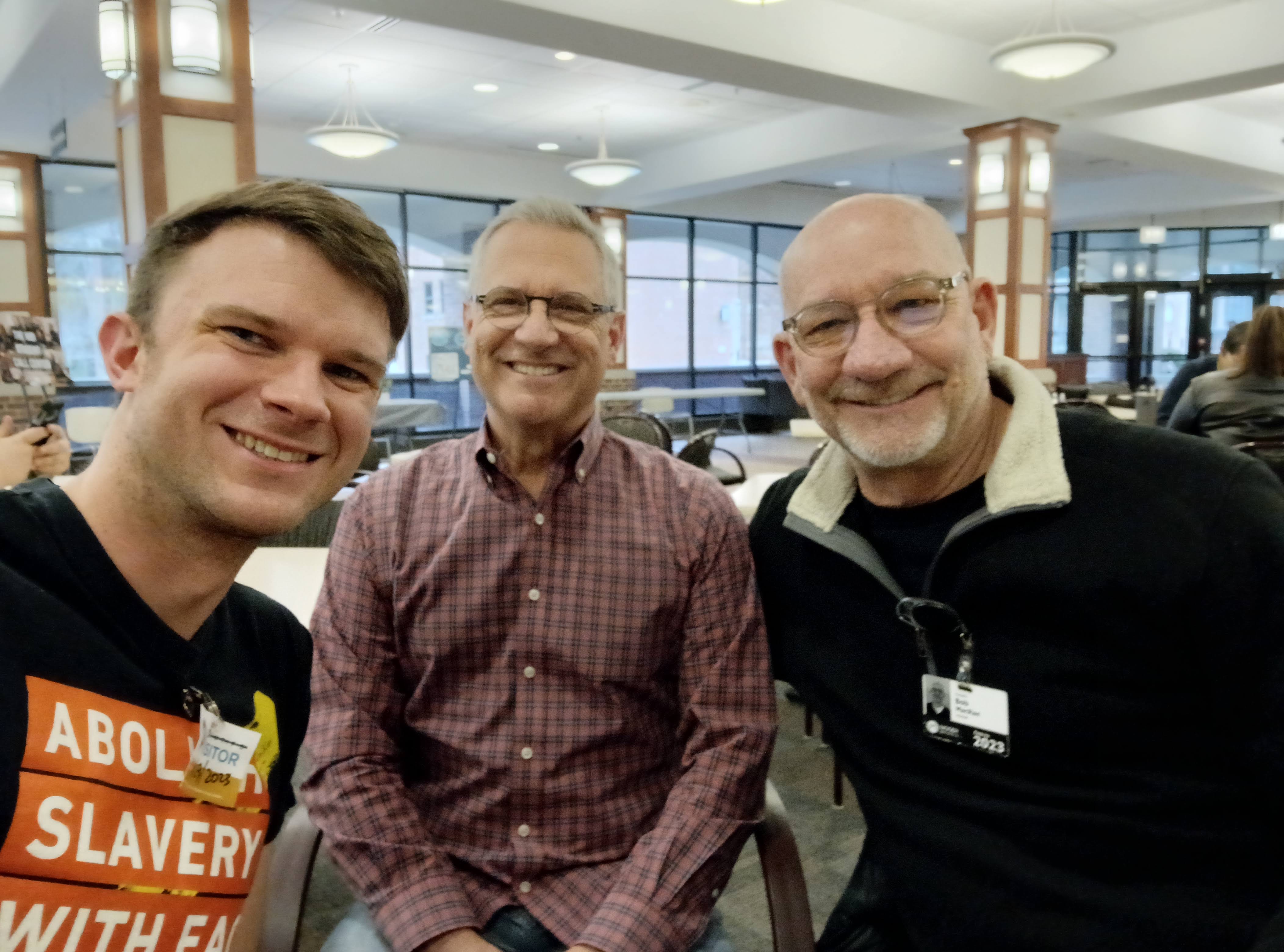Detour to Japan
- September 11, 2023
- ~ 6 minute read

One method Kevin Cochrane uses to advance the gospel in Japan is filming and posting videos on YouTube. Photo courtesy of Kevin Cochrane
When Kevin Cochrane left Grand Rapids, Michigan, in 2007 and arrived at Moody Bible Institute to become a youth pastor, he never dreamed his plans would take a major detour—to Sendai, Japan.
“I definitely did not go to Moody planning to be a missionary,” Kevin says. “I studied youth ministry, and I was planning to be a youth pastor in the States. But then, in my very first youth ministry class with Dr. Bob MacRae, he shared a statistic that really blind-sided me.
“Dr. MacRae said, ‘In the world of youth pastors who have been professionally trained and get paid as a full-time youth pastor, about 97 percent of them are serving in North America, primarily the US. But about 97 percent of the world's teenage population lives outside of the US.’”
The statistic prompted Kevin to do some soul searching.
“So there's a huge imbalance of full-time youth workers and where they're ministering,” Kevin says. “That really got me thinking . . . is there a greater need for me to be in the States, or is there a greater need for me to be outside the States?”
Dr. Bob MacRae not only remembers that statistic, he remembers Kevin as well and is still in touch with him. “I always appreciated Kevin’s seriousness towards ministry,” Dr. MacRae says. “He has such a heart for the lost. That has grown over the years, but it was visible as a student.”
‘I finally surrendered to His call’
After attending Moody’s Missions Conference in the fall of 2008, Kevin began praying about serving as a long-term missionary. Over the next two years, he participated in several short-term trips with fellow Moody students, serving in the Czech Republic, the Philippines, and Mexico.
“Those short-term trips helped me realize there's a variety of places and ways that you can serve God cross-culturally,” Kevin says. “God strongly spoke to me during that time, and I felt Him calling me to be a long-term missionary. I resisted that for a while, but I finally surrendered to His call on my life.”
During his last year at Moody, God began to burden Kevin’s heart for the country of Japan, where he had never been. After receiving his Bachelor of Arts in Youth Ministry in 2011, he joined SEND International and moved to Tokyo for language school.
“After language study in Tokyo,” Kevin explains, “I worked with after-school youth clubs, camp ministry, youth outreaches, and discipleship. I did that for two and a half years, then I moved to Sendai to focus on church planting.”
Bringing hope to the hopeless

About eight years into his ministry in Japan, Kevin felt God was leading him to change missions organizations. He left SEND with fond memories and joined Commission To Every Nation in early 2023.
Commission To Every Nation describes Japan as “a modern, safe, and beautiful country. But beneath the surface, there are many problems burdening its people, like a high suicide rate, depression, loneliness, a difficult work culture, fragmented families, and a lack of hope. It is also estimated that between 80–90 percent of people in Japan have never heard the gospel explained to them even once.”
It was those “never heard” statistics that impacted Kevin’s original decision to go to Japan. “That was actually one of the biggest reasons I felt led to go to Japan in the first place. I didn't know much about it, but I also didn't realize it was so unreached.”
“It would seem that Japan would be a very ‘easy’ country to reach in the sense that there's no persecution, no political obstacles. There’s religious freedom. I even have a religious worker visa, and I’m helping to plant a church. I can share the gospel and give a Bible to anyone who will take one. But beneath the surface, there are a lot of things that make it difficult for people to become Christians in Japan.”
Hurdles to reaching the Japanese
Some statistics say that evangelical Christians account for less than one percent of the population in Japan, while a mix of Buddhism and Shintoism make up the majority of religious practices. Many Japanese would also consider themselves non-religious. Kevin says, “There's a lot of spiritual warfare here. I know the Enemy has a grip on this country, and he doesn't want to give it up.”
Cultural obstacles exist as well. “Generally speaking, America is very individualistic. But in Japan, it's a very group-oriented culture,” Kevin says. “People often think about how (what they believe) will affect their family, their neighborhood, and their coworkers. They really take the relationships around them seriously, and they don't want to disrupt the harmony.”
Some Japanese are curious about Christianity, but it’s difficult for them to just casually attend a church. “Usually (new people) are invited by a Christian friend who's already going to the church,” Kevin says. “They trust their friend, and they might want to see what their friend does on Sunday. We don't get many people who just come randomly.”
Putting his Moody training to work
Kevin left Moody with preparation and skills that he still uses daily in Japan. He is currently serving as interim pastor at a church plant in Sendai while his teammate and family are on home service. “Obviously, things like how to study the Bible, how to interpret the Bible, how to understand the narrative—those things are very helpful,” he says.
But something else has been crucial to reaching the Japanese people: knowing how to explain Scripture and the gospel in a way that is culturally and linguistically understandable without compromising the truth—knowing how to contextualize them.
“Until you leave your own country and you start speaking in a different language,” Kevin says, “it’s hard to realize that your Christianity and your understanding of the Bible are very much shaped by your environment, your upbringing, and your language.”
Although, like the US, Japan is led by a democratic form of government and embraces capitalism, the two countries’ general concept of God is totally dissimilar.
“For example, most people in America, even if they're not Christians, have a general understanding of a concept like ‘God loves you.’ They would understand that God is this kind of singular, all-powerful being who made the universe,” Kevin says. “But the word ‘God,’ when translated into Japanese, means more like millions of little gods, like spirits. So if you say ‘God loves you,’ what a lot of Japanese people would hear is something like ‘Millions of different little spirits love me.’
“The concept of an individualistic God who loves people is very hard for them to grasp. There are many ideas you need to contextualize and explain in Japanese.”
Kevin says his education at Moody prepared him well for this stark change. “Moody helped me realize that when you get to the mission field, not everybody thinks like Americans do,” he says. “You have to understand that. Otherwise, when you share the gospel, you're not going to be very effective if you don't contextualize it. In that sense, Moody really helped me prepare.”
Learning to contextualize is still a main focus of some of Dr. Bob MacRae’s courses at Moody, and he’s in touch with Kevin regularly. “It is hard to go into a new culture, learn a new language, adjust to new foods,” Dr. MacRae says. “But Kevin’s love for Jesus and God’s call upon his life outweighs his concern for these sacrifices.”
Unexpected tool for evangelism
When Kevin’s regular routine was altered during the COVID-19 pandemic, he and a few friends began developing a series of evangelistic YouTube videos. With so many Japanese using YouTube and other social media, Kevin saw the strategic value in these platforms to share the gospel.
“God is slowly growing the channel’s reach to more and more Japanese people,” Kevin says.
“Kevin’s videos are evangelistic in nature, spoken in Japanese, and are getting some good attention. I am so proud of what he is doing, and I’m on his prayer team,” Dr. MacRae says. “In fact, we connected in person this past spring semester when he was on home assignment.”
When he thinks back over the last decade, Kevin sees how much he’s learned and how much God has taught him about life as a missionary and about himself. For anyone wanting to serve on the mission field, he has some advice on what to bring and what not to bring.
“Don't come with an attitude that you know so much and have so much to offer. When you graduate from Bible school, it’s easy to think you know everything,” he laughs. “But don’t bring that kind of attitude. Whatever weaknesses or struggles you're going through, all of those things will be squeezed out and amplified when you're on the field. So as much as possible, bring with you a focus on an ever-deepening and intimate walk with God. If your relationship with God isn’t first and foremost, you’ll get burned out or discouraged or quit and not be very fruitful.”
For anyone who is considering Moody for their undergraduate studies, missions-focused or otherwise, Kevin says, “At Moody, you’ll get a very professional, solid, robust biblical education. You’ll be blessed with a community that loves God, wants to serve Him, and wants to make Him known.”

Kevin visited former professors like Tim Downey and Bob MacRae during a recent stay in the United States. Photo courtesy of Kevin Cochrane

